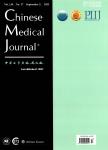Effects of irbesartan on atrial cell electrophysiology
Effects of irbesartan on atrial cell electrophysiology出 版 物:《中华医学杂志(英文版)》 (Chinese Medical Journal)
年 卷 期:2005年第3期
页 面:56-58页
核心收录:
学科分类:1002[医学-临床医学] 100201[医学-内科学(含:心血管病、血液病、呼吸系病、消化系病、内分泌与代谢病、肾病、风湿病、传染病)] 10[医学]
主 题:irbesartan · arrhythmia · electrophysiology · ion channels
摘 要:Atrial fibrillation (AF) is the most common sustained arrhythmia encountered in clinical practice.~1 Its incidence increases with age and the presence of structural heart disease. It is a major cause of stroke, especially in the elderly. It has been shown that angiotensin converting enzyme inhibitor (ACEI) can reduce the incidence of AF after acute myocardial infarction.~2 Several studies have shown that activation of the rennin-angiotensin system is associated with the mechanisms of AF. Irbesartan is a long-acting angiotensin Ⅱ type 1 receptor antagonist used widely in the treatment of hypertension.~3 In recent years, it has been demonstrated that patients treated with amiodarone plus irbesartan had a lower rate of recurrence of atrial fibrillation than did patients treated with amiodarone alone.~4 These findings suggest that the inhibition of angiotensin Ⅱ may prevent AF, but its underlying electrophysiological mechanisms are obscure. The purpose of this study is to investigate the effects of irbesartan on atrial cell electrophysiology.



